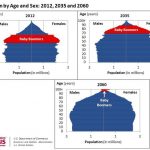Baby Boomers aren’t buying senior housing says researcher

TORONTO: New research confirms that Baby Boomers have turned their back on traditional retirement living options.
Almost 20 years ago, Canadian demographer David Foot wrote “Boom, Bust and Echo,” in which he claimed that “demographics explains two-thirds of everything — whether the subject is business planning, marketing, human resources, career planning, corporate organization, the stock market, housing, education, health, recreation, leisure, and social and global trends.” One of the lessons in that book was to follow the baby boomers, the oldest of whom are now 72 and the youngest 58.
It may be a shock to young readers and marketers, but that’s not old. That’s why it is hilarious to read articles like the recent one in the Wall Street Journal titled Baby Boomers Are Living at Home. That’s Bad News for Senior-Housing Developers. Esther Fung writes:
It seemed one of the surest bets in real estate: build senior-housing facilities that cater to aging baby boomers who will require more care. The problem is, boomers haven’t much cooperated.
That’s because these developers didn’t look at the numbers, and they jumped the gun. Most people don’t go into senior housing until they are well into their 80s. But marketers and builders looked at all these aging boomers and thought, if we build it, they will come. But the baby boomers are still driving their cars and still going to work and some are still raising kids. They are simply not the demographic that needs this stuff. Yet.
The vast majority of people moving into so-called senior housing are the parents of baby boomers. And even they-re not moving in as quickly as expected. According to Fung:
Seniors older than 80 are part of the so-called Silent Generation, which suffered through the Great Depression and World War II. Many remain more frugal and independent and resist moving into group housing, analysts say.
The majority of the oldest baby boomers won’t be knocking on the doors of senior housing for 10 years, and many of them for close to 20. Thanks to the decline in smoking, they are a lot healthier than people their age used to be. They are too young for senior housing.
It’s a fundamental demographic mistake that people are making everywhere. Everyone is surprised that the baby boomers aren’t moving out of their houses so millennials can buy them, but in fact, according to a recent survey, most boomers have no interest in selling their homes right now. Mark Fleming writes: “Approximately 85 percent of baby boomers surveyed indicated they are not planning to sell their home in the next year. The main reason, according to the survey, is that their current home meets the needs of their family.”
But follow that demographic bulge, and you see a very different story in 10 to 15 years. Two studies quoted in the Washington Post see a huge bust coming down the road.
Fannie’s study estimates that from 2016 to 2026, between 10.5 million and 11.9 million older owners will end their ownership status. Between 2026 and 2036, another 13.1 million to 14.6 million will do the same. This massive and unprecedented generational unloading of houses could be “negative for the home sales market,” the Fannie study warns, because the upcoming generations of buyers may not have the financial capacity — or desire — to absorb the large numbers of homes coming to market.
Planning professor Arthur Nelson predicts a housing crash, with prices dropping “a quarter or a third or more.” And most of those baby boomers are going to need that equity from their houses to pay for the expensive senior housing they will have to move into at some point. Will this lead to suburban bargains for millennials? Not necessarily. From the Post:
This massive and unprecedented generational unloading of houses could be “negative for the home sales market,” the Fannie study warns, because the upcoming generations of buyers may not have the financial capacity — or desire — to absorb the large numbers of homes coming to market.
I know I sound like a broken record here, (remember those?) but as I wrote in It won’t be pretty when the boomers lose their cars or The issues for boomers won’t be ‘aging in place’, in 10 or 15 years, the problems we face in transportation and urban design are going to be significant, and we should all be planning for it now.
Yet in all the discussions about infrastructure, what are the politicians planning to spend money on? According to CNBC:
Infrastructure could be one of a few areas of partnership between Democrats and Republicans, with members of both parties calling for improvements to the country’s aging bridges, roads and airports. Ever since Trump announced his bid for the White House, he has lambasted what he’s categorized as “horrible infrastructure problems” throughout the United States.
They might want to look at that demographic bulge and start planning for what 70 million 85-year-olds need, and it won’t be highways — it will be safe sidewalks, better transit and reconfiguring our cities so that older people will be close to doctors and shopping and things they need without having to drive there. They might want to think about rebuilding suburbia instead of airports.
As planner Tim Evens pointed out, we don’t need aging in place, we need places to age.







